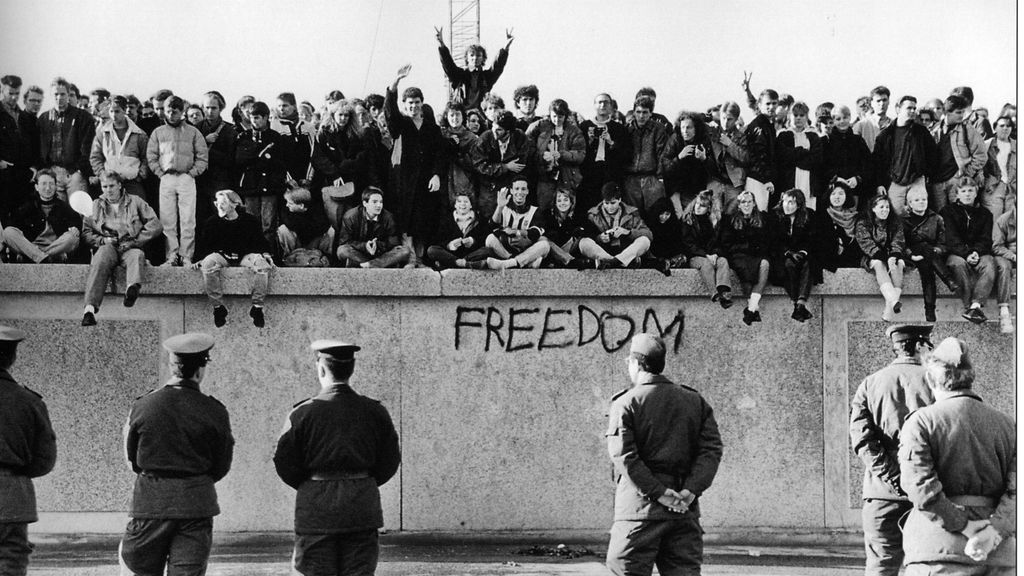
30 years without the Berlin Wall
This November 9, we commemorate three decades since the fall of the Berlin Wall, one of the most important events of the twentieth century. The Club de los Viernes and Civismo have organised an event commemorating the end of the Iron Curtain, which was a historical starting point for millions of citizens to benefit from a new climate of freedom and prosperity.
The day started with a floral offering to the victims of communism in Madrid’s Parque de Berlín, where several remains of the Wall are preserved. Afterwards, we held the central act of the anniversary: a roundtable on communism from an economic and political perspectives. Held at the San Pablo CEU University, the colloquium was attended by the French historian Stéphane Courtois, specialised in the study of communist regimes; the professor of Applied Economics and Public Finance, as well as the secretary of Civismo’s board, Francisco Cabrillo; journalists Federico Jiménez Losantos and Hermann Tertsch, and the professor of Philosophy of Law, and member of the Club de los Viernes, Francisco José Contreras.
«Communism had no solution from the economic point of view, besides being an infamous regime»
Francisco Cabrillo
As masters of ceremonies, Ángel Fernández, representing the Club de los Viernes, and Julio Pomés, president of Civismo, urged «not to be content with remembering that historic milestone», but rather «ask ourselves what to do to be free today, a challenge that requires a brave fight against the comfort of being part of a passive and homogeneous crowd”.
Courtois, author of the best-seller The Black Book of Communism, assured that with the fall of the Wall, “the immense imposture of the communism of the twentieth century systematised by Stalin was sinking, although the communists presented themselves as the victors of fascism and their martyrs. Then the propaganda that had been covering up since 1917 an economic and social disaster was revealed, although it was the essentially criminal dimension of these regimes that exploded in the face of those who still believed in this ideology, which professed an inexhaustible hatred towards parliamentary democracy». Courtois pointed out that its end involved an “explosion of freedom of speech, for which tens of thousands of persecuted people and the descendants of those who had been murdered demanded justice. However, the crimes against humanity and genocide perpetrated by these regimes have not led to the creation of any international court to try them.” He also deplored that «the de-communisation of the regimes overthrown in the countries of the Soviet Union, either has not occurred, or only partially, since there are still communist parties in them, and even state denialism in Russia.» For this reason, he is in favour of the creation of an institution according to the model of the Nuremberg trials. “It is time that justice is done to all the victims of communist totalitarianism and the judgment of history is issued; if not, our complicity will persist”, he concluded.
Professor Cabrillo added that “apart from an infamous regime, communism had no solution from an economic point of view. When one crossed the Wall, the problem was clear there, it was a living photograph of what was happening, there was nothing to buy, there were only shops for foreigners and the nomenklatura where you could pay with German marks and dollars. Berlin was a sad city. When the Wall fell, it was seen that the standard of living of societies of Eastern Europe was very low, due to low productivity, as there were no incentives”.
Losantos stressed that «communism is something that belongs to the intellectuals and not the workers, a criminal ideology that raised the Wall and caused one hundred million deaths. A lie based on terror, and the terror to impose the lie, and today there is some in that West that has lost any moral conscience to fight for freedom in the world”. Tertsch stated that “those who have fought alone against communism deserve full respect, in the face of retaliation; and is that this ideology should be as proscribed as Nazism. «
Finally, Contreras stressed the importance of paying tribute to the victims of communism: «very asymmetric with respect to those of Nazism.» And he concluded by affirming that the «criminal seed is already in Marx’s ideas, not that Marxism has become dehumanised with Stalin, as they have made us believe by calling Communism Stalinism.”